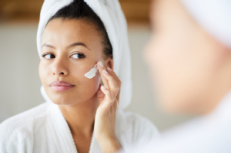What Are Collagen Peptides?
January 11, 2022

If you are reading this, hopefully you know a thing or two about collagen. If not, click here to learn more about the basics so we can dive a little bit deeper.
Collagen is a protein that is better absorbed and digested when it is broken down into smaller pieces called peptides. Peptides are smaller pieces of the chains of amino acids that make up a protein. In order to break collagen down into peptides, the first step is to separate the long chains of amino acids that wrap around each other (kind of like a rope). Next, a very specific and controlled enzymatic hydrolysis reaction is performed to create collagen peptides with a low molecular weight.
But the outcome of this process can vary from one source of collagen peptides to another, resulting in different peptide profiles. In fact, different sources of collagen peptides have their own unique profile, and some peptide profiles are more effective than others. Like two different fingerprints, they may appear similar on the surface, but when you look closely, there are significant differences. Likewise, the differences in the composition of peptides may seem small, but small differences in the composition of collagen peptides can have a dramatic difference in their ability to stimulate collagen. The results presented below are only applicable to specific collagen peptides. These specific bioactive collagen peptides undergo a patented process to create a unique composition of peptides, or peptide profile.
Research on Bioactive Collagen Peptides
Research on these bioactive collagen peptides began with in vitro work on primary human dermal fibroblasts. Fibroblasts are specific cells that are in the dermis layer of the skin and are responsible for making collagen for the skin. This preliminary research demonstrated a stimulatory effect of specific bioactive collagen peptides on the expression of important proteins in the skin. Most importantly, there was a pronounced and statistically significant increase in type I collagen expression (data not published).
After this research discovered that a specific composition of collagen peptides was optimized to produce higher levels of collagen synthesis than generic collagen peptides, researchers needed to conduct human clinical trials to measure the clinical effectiveness of these collagen peptides. The term BCP represents the specific bioactive collagen peptides for beauty from within benefits in these studies.
Published Study #1: Skin Elasticity
The first of many human clinical trials was a double-blind, placebo-controlled trial, with 69 healthy women ages 33-55 years who were randomized to receive either 2.5 grams or 5 grams of BCP, or a placebo once daily for 8 weeks. Skin elasticity was measured as the primary outcome, along with several other aspects of skin health. The results showed that BCP significantly increased skin elasticity compared to placebo at both doses provided. This effect was significant in as little as 4 weeks and persisted after 8 weeks of supplementation. Interestingly, in some women a maximum increase of skin elasticity up to 30% could be observed after 8 weeks1.

Published Study #2: Skin Wrinkles
The second human clinical was even larger, with 114 women ages 45-65 years who were randomized to receive either 2.5 grams of BCP or placebo. This was a double-blind, placebo-controlled study to determine the effectiveness of BCP on eye wrinkles and stimulation of collagen and elastin in the skin. Eye wrinkle volume (crow’s feet) was measured using a specific instrument that captured images of the skin and then compared those images taken at the beginning of the study (baseline) with those taken at the end of the study. Collagen and elastin levels were measured using suction blister biopsies. This is a method of measuring skin proteins by taking a small biopsy of the skin using a suction chamber and then analyzing it.
The results showed that BCP significantly reduced eye wrinkle volume after 4 weeks, and this effect was even more pronounced after 8 weeks with an average reduction of 20% compared to the placebo group. Procollagen type I content increased by 65% after 8 weeks of BCP treatment, which was a statistically significant change compared to placebo. Procollagen type I is the precursor to the making of collagen type I, which is the most abundant type of collagen in the skin. In addition to the increase in collagen, BCP also increased elastin content of the skin by 18% compared to the placebo. Collagen and elastin are crucial to skin structure, firmness, and elasticity2.
Published Study #3: Nail Support
The third human clinical was an exploratory study to determine if BCP has any impact on nails. It was an open-label clinical trial, with 25 participants who took BCP daily for 24 weeks. Nail growth rate and broken or chipped nails were evaluated along with a physician's evaluation of brittle nails. The results were very promising, showing that BCP treatment promoted an increase of 12% in nail growth rate and a decrease of 42% in the frequency of broken nails. Additionally, 64% of participants in this study achieved a global clinical improvement in brittle nails. The majority of participants in this study agreed that the use of BCP improved their nails’ appearance and was completely satisfied with the performance of this product3.
There are additional studies on these BCP for hair health4 and the skin on the body (5), but we will save those for another day. The study results are impressive on their own, and even more impressive when you consider these are published in scientific journals where they are peer-reviewed for increased credibility. It cannot be assumed that different collagen peptides would provide the same effects. So, the results of these studies and beneficial effects cannot be extrapolated to generic collagen peptides, and instead are specific to this source of bioactive collagen peptides.

Beauty Focus Collagen+
Nu Skin scientists know the importance of ingredient sourcing when it comes to formulating great products, and Beauty Focus Collagen+ is no exception. Our scientists formulated this product with these specific bioactive collagen peptides to achieve these proven results. We also added lutein and phytoceramides to the blend for even more benefits. This blend was put to the test in a double-blind clinical study and showed remarkable results6. More information on this study is coming in the future, but in the meantime, cheers to sipping away to beauty from within!

Written by:
Tanner Gibb
Technical Communication & Education Manager
Pharmanex
References:
- Proksch E, Segger D, Degwert J, Schunck M, Zague V, Oesser S. Oral supplementation of specific collagen peptides has beneficial effects on human skin physiology: a double-blind, placebo-controlled study. Skin Pharmacol Physiol. 2014;27(1):47-55. doi:10.1159/000351376.
- Proksch E, Schunck M, Zague V, Segger D, Degwert J, Oesser S. Oral intake of specific bioactive collagen peptides reduces skin wrinkles and increases dermal matrix synthesis. Skin Pharmacol Physiol. 2014;27(3):113-119. doi:10.1159/000355523
- Hexsel D, Zague V, Schunck M, Siega C, Camozzato FO, Oesser S. Oral supplementation with specific bioactive collagen peptides improves nail growth and reduces symptoms of brittle nails. J Cosmet Dermatol. 2017;16(4):520-526. doi:10.1111/jocd.12393
- Oesser (2020). The oral intake of specific Bioactive Collagen Peptides has a positive effect on hair thickness. Nutrafoods, 1:134-138.
- Schunck M, Zague V, Oesser S, Proksch E. Dietary supplementation with specific collagen peptides has a body mass index-dependent beneficial effect on cellulite morphology. J Med Food. 2015;18:1340–1348. doi: 10.1089/jmf.2015.0022
- Shelly Hester, Steven Wood, Russell Gray, Dale Kern, Zoe Draelos, Collagen Supplement Improves Skin Attributes in Healthy Adults, Current Developments in Nutrition, Volume 5, Issue Supplement_2, June 2021, Page 321, https://doi.org/10.1093/cdn/nzab037_031
-
Collagen is incredibly important because it is the main protein found in our connective tissue. Connective tissues are what hold us together, creating the foundational structure and framework of our bodies. In fact, collagen composes about 70-80% of our skin’s dry weight1.
-
Adaptogens are natural herbs or roots that help your body adapt to or resist stress. They are usually consumed as a supplement, food item, or tea. But what exactly do adaptogens do?

